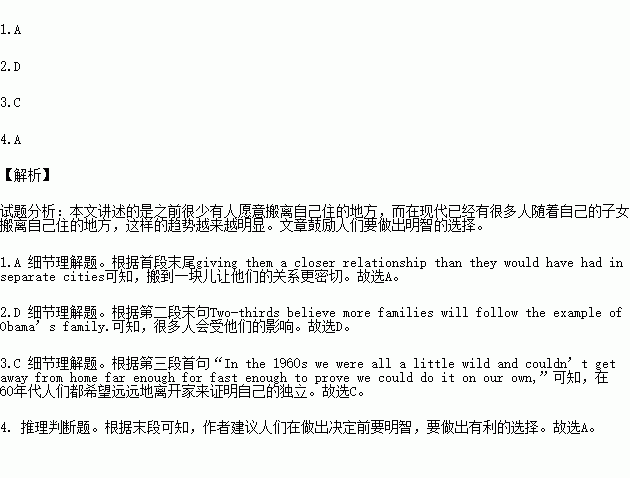题目内容
Grandparents Answer a Call
As a third-generation native of Brownsville, Texas, Mildred Garza never planned to move away. Even when her daughter and son asked her to move to San Antonio to help with their children, she politely refused. Only after a year of friendly discussion did Ms. Garza finally say yes. That was four years ago. Today all three generations regard the move as a success, giving them a closer relationship than they would have had in separate cities.
No statistics show the number of grandparents like Garza who are moving closer to adult children and grandchildren. Yet there is evidence suggesting that the trend is growing. Even President Obama’s mother-in-law, Marian Robinson, has agreed to leave Chicago and move into the White House to help care for her granddaughters. According to a study by grandparents. Com, 83 percent of the people said Mrs. Robinson ’s decision will influence grandparents in the American family. Two-thirds believe more families will follow the example of Obama’s family.
“In the 1960s we were all a little wild and couldn’t get away from home far enough for fast enough to prove we could do it on our own,” says Christine Crosby, publisher of Grand, a magazine for grandparents.“We now realize how important family is and how important it is”to be near them, especially when you’re raising children.”
Moving is not for everyone. Almost every grandparent wants to be with his or her grandchildren and is willing to make sacrifices, but sometimes it is wiser to say no and visit frequently instead. Having your grandchildren far away is hard, especially knowing your adult child is struggling, but giving up the life you know may be harder.
1.Why was Garza’s move a success?
A. It strengthened her family ties.
B. It improved her living conditions.
C. It enabled her to make more friends.
D. It helped her know more new places.
2.What was the reaction of the public to Mrs. Robinson’s decision?
A. 17% expressed their support for it.
B. Few people responded sympathetically.
C. 83% believed it had a bad influence.
D. The majority thought it was a trend.
3.What did Crosby say about people in the 1960s?
A. They were unsure of themselves.
B. They were eager to raise more children.
C. They wanted to live away from their parents.
D. They had little respect for their grandparents.
4.What does the author suggest the grandparents do in the last paragraph?
A. Make decisions in the best interests of their own.
B. Ask their children to pay more visits to them.
C. Sacrifice for their struggling children.
D. Get to know themselves better.
 阅读快车系列答案
阅读快车系列答案
